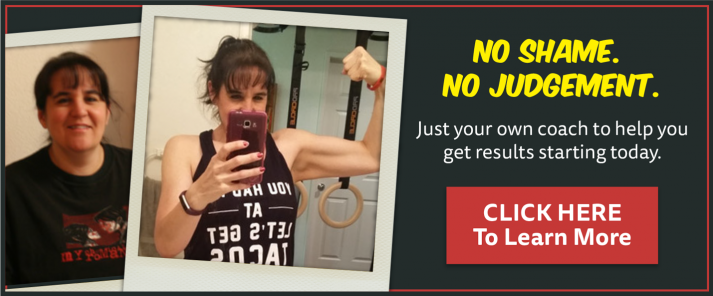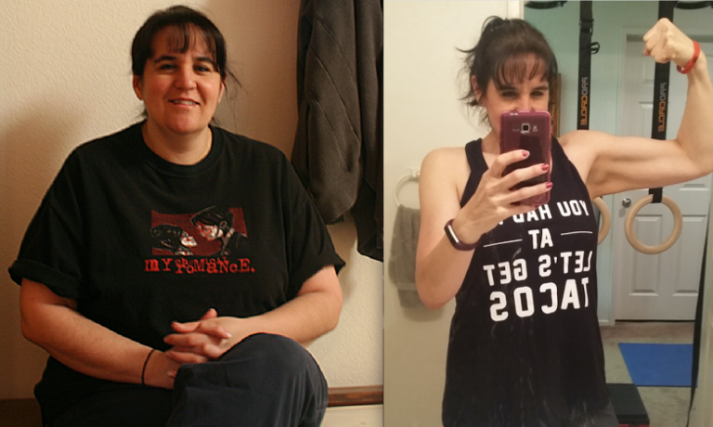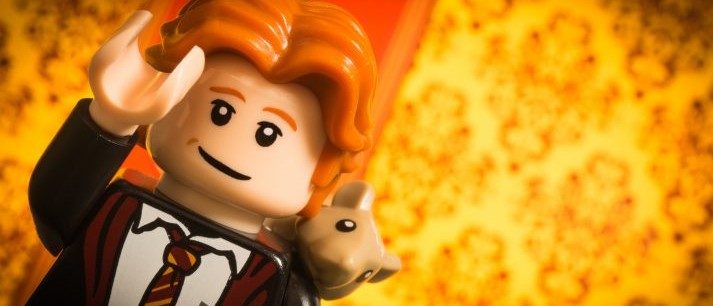
“Why can’t I lose weight, Steve?”
This question breaks my heart every time I hear it. And I hear it multiple times per day from frustrated people like yourself.
Some of those people are our 1-on-1 coaching clients, who we work closely with to uncover the truth.
And that’s what we’re after: the truth on why weight loss is so tough to achieve.
Why “eat less and move more” sounds nice in theory, but is insulting to those who KNOW this, try their best, and still can’t lose weight.
We’ll tackle today’s topic with statistics, science, and plenty of Harry Potter analogies. This is Nerd Fitness after all.
We’ll go over:
Let’s jump in, Scuba Steve style, so you can start seeing results!
If you’re somebody that wants a Yoda in your corner to coach you through the ups and downs of your fitness journey, we’re here for you with our Online Coaching Program!
No shame or judgments – just a supportive person who works hard to help you succeed 🙂
Why the Nutrition Industry Makes Me So Angry
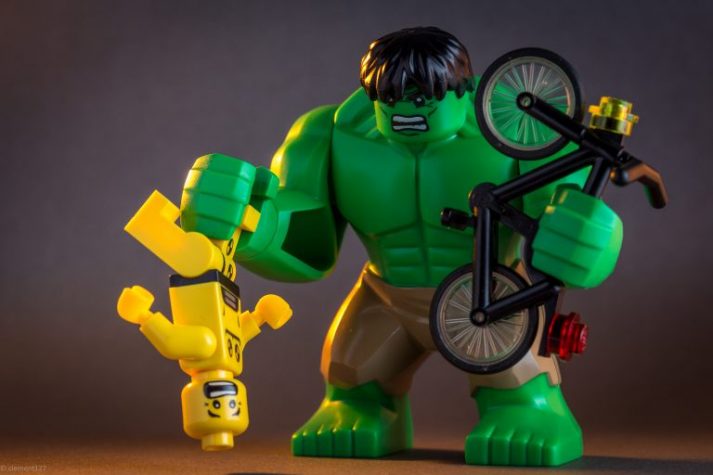
I took this picture walking around Manhattan last week:
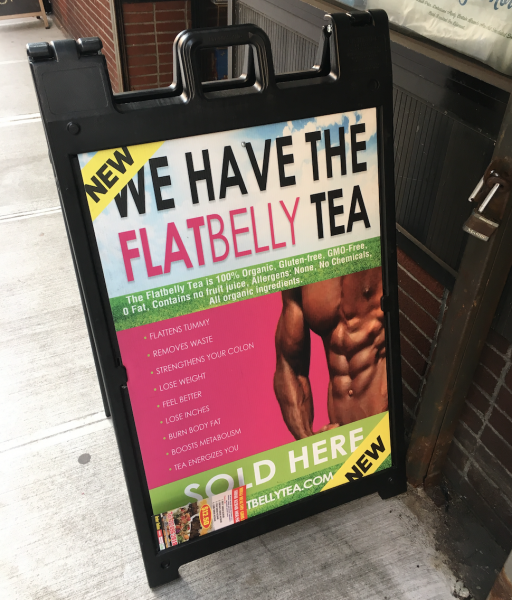
There is some SERIOUS psychological warfare going on here, and it hurts my soul.
For starters, they advertise as “THE” flat belly tea.
This means there are many other companies selling similar products, which would ALSO lead me to believe this is a lucrative product to sell!
They list every fitness buzzword and term every marketer uses when it comes to selling health and fitness:
- Gluten-free
- Removes waste
- Organic
- Burn fat
Including some real head-scratchers.
“Strengthen your colon?”
How the hell do you strengthen your colon?!
This reminds me of the brilliant Saturday Night Live skit about “Colon Blow” cereal:

But I digest digress…
People are buying this stuff, even if they know it probably won’t work.
Like buying a lottery ticket even when we know the odds of winning are 0% – what we’re really buying is “hope”:
- Hope that this will actually work – unlike the last 10 attempts.
- Hope we can overcome 20 years of bad choices with a beverage.
- Hope that this product will give us the confidence and self-love we deserve.
Don’t get me wrong.
“Hope is a good thing, and no good thing ever dies.”
I just HATE when hope gets weaponized to sell you expensive snake oil and pretty-packaged fluff.
This is what we are rebelling against here in the NF Rebellion: marketers and companies who are crappy enough to prey on our hopes and fears and sell snake-oil in a bottle.
We’re also rebelling against that voice in our head that talks down to us, calls us failures for not getting in shape yet, and berates us every time we break down and eat a cookie.
I say no more.
Let’s fight fire with fire science.
How Much Exercise Do I Need to Lose Weight?
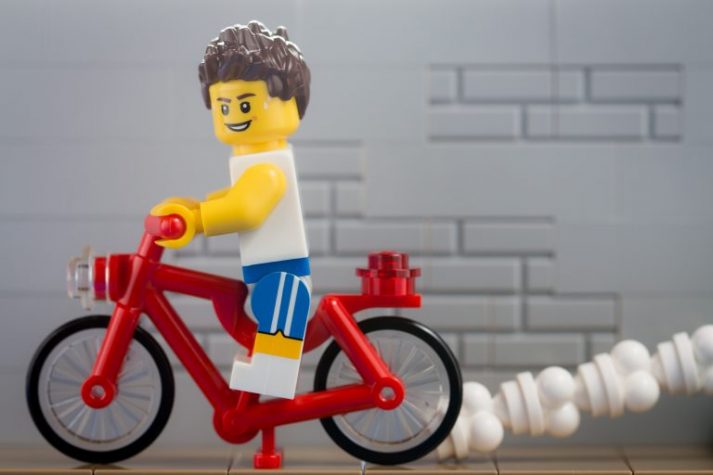
There are a few generally accepted truths when it comes to weight loss.
All of these come with baggage attached, and your results will vary depending on your:
Setting all of that aside, I’m going to try and keep things simple just to prove my point.
Let’s go with an (understandably) oversimplified look at weight loss: a pound of fat equals around 3,500 calories.[1]
This would mean you’ll need to either eat 3,500 fewer calories, or burn an extra 3,500 calories to lose 1 pound of fat.
So…how long does it take to burn 3,500 additional calories per week?
Let me answer a question with another question:
…How many hours do you have?
Studies show you’ll burn an extra 100 calories (approximately) when walking or running a mile.[2]
So, you would need to be running/walking an additional 5 miles per day, 7 days a week, to lose one pound of fat per week.

I don’t know about you, but I don’t have time to run an extra 5 miles a day.
Nor do I want to!
Not only that, but as you’ll see below – this idea of just burning an extra 500 calories per day to lose a pound a week only works early on.
You’ll quickly run into speed bumps and roadblocks – figurative ones, try to avoid the real ones on your run – that slow down your progress significantly.
Simply put, exercising your way thin has been proven time and time again not to work.
Here are three such reports:
#1) Many people develop increased appetites as a result of exercise, which leads to no weight loss.[3] Time Magazine got in trouble for pointing this out – even though they were right!
#2) A 2011 systematic review and meta-analysis came to the conclusion:[4]
“In overweight and obese populations… our results show that isolated aerobic exercise is not an effective weight loss therapy.”
#3) Another study compared people who dieted vs people who only exercised:[5]
Body weight decreased by 10% in the diet group and by 9% in the diet–exercise group, but did not decrease in the exercise group or the control group.
What I’m trying to say, and a lesson we try to deeply understand at Nerd Fitness: “you can’t outrun your fork”
…and the bad news isn’t done.
How Our Metabolism Responds to a Caloric Deficit (6 Facts)

When you start to lose weight, your resting metabolism slows down.[6]
You might think this is some sort of evil sorcery worthy of “He Who Must Not Be Named,” but unfortunately – it’s just 2nd-grade math.
When you start to lose weight, there is less of you that needs fuel.
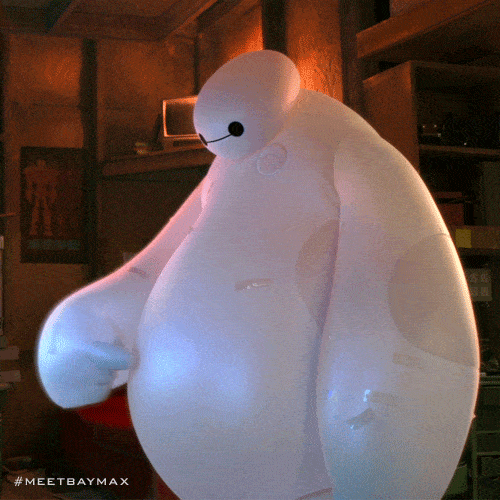
In other words: your metabolism doesn’t have to work as hard to fuel all of your bodily functions, has less weight to carry, and thus it will burn significantly fewer calories compared to when you were much bigger.
Here is the estimated daily resting calorie burn (“sit on your ass all day”) of a 35-year old male nerd at 3 very different weights – as determined by our free Calorie Calculator:
- 300 lbs: 2,600 calories.
- 250 lbs: 2,300 calories.
- 200 lbs: 2,000 calories.
WHAT THIS MEANS: Unless you adjust your calorie intake as you lose weight, your calorie intake will become less and less effective for weight loss, until you hit equilibrium.
Put a different way: this person could eat 2,300 calories per day and over time, lose 50 pounds (from 300 pounds to 250 pounds), but that’s where he’ll hit equilibrium: calories burned equals calories consumed.
In order for him to lose the next 50 pounds, he’ll need to decrease his caloric intake even more, and then STAY at that calorie consumption to keep the weight off.
And then it gets even worse!
There is a solid body of evidence on a bodily feature called “adaptive thermogenesis.”[7]
Which has nothing to do with the band Genesis – though feel free to listen to “Invisible Touch” right now.
It might soften the blow while you learn about “adaptive thermogenesis.”
“Adaptive thermogenesis” refers to the process in which our bodies will adjust based on how many calories we burn – and do whatever it can to preserve the body fat we have.[8]
Our bodies WANT to maintain the extra body fat we have (“I don’t know when I’ll need this, better save”), and are actively working in unison to preserve it – so even after a few pounds are lost from running, it’s going to be a persistent challenge to keep the weight off.
As pointed out in the article above:
“In long-term studies of weight-reduced children and adults, 80%-90% return to their previous weight percentiles, while studies of those successful at sustained weight loss indicate that the maintenance of a reduced degree of body fatness will probably require a lifetime of meticulous attention to energy intake and expenditure.”
This is why so many people can LOSE weight, but can’t seem to keep the weight off.[9]
This doesn’t even factor in all of the other challenges surrounding weight loss: an “obesogenic” environment (you can smell Cinnabon minutes before seeing it), psychological challenges like depression and anxiety, menopause, medications, and hormones.
These factors cause us to crave high-calorie foods, increase our odds of fat gain, and make it tough to keep our calorie intake in-check, because chocolate cake.
To Recap Why Weight Loss Is Difficult:
- You can’t exercise your way to weight loss.
- Your metabolism slows down when you lose weight.
- Your environment makes it difficult not to overeat.
- Your body will try to keep its fat stores.
- Even when you lose weight, your body wants to keep the fat it has.
- If you lose weight, you’ll have to stay diligent or you’ll put the weight back on.
This is all terrible, horrible, no good, very bad news.
And the toughest truth of all: Due to those factors above, it might not be your fault that you’re overweight…but it IS your responsibility to navigate!
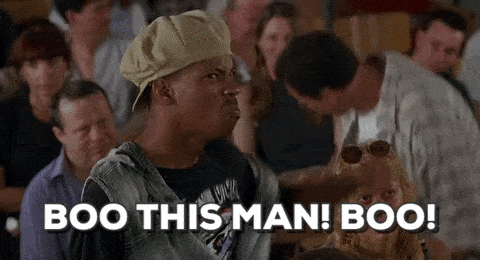
I know, I know.
However, there is HOPE!
And here at Nerd Fitness – and in the Star Wars universe – rebellions are built on hope.
We have thousands of success stories from people who thought they couldn’t lose weight…until they did.
People HAVE lost weight, and kept it off.
People who are older, bigger, have more children, less money, more illnesses, and bigger hardships than you.
It’s a constant battle, but one that’s absolutely worth fighting.
And this means that you are not broken. You don’t have metabolic damage. You are not doomed.
Sure, you’re flawed.
You might be playing life on “Legendary” difficulty, but people like you have succeeded.
It starts by using all of the tools at our disposal, because the forces working against us are doing the same.
Let’s get nerdy.
The Science of Fat Loss
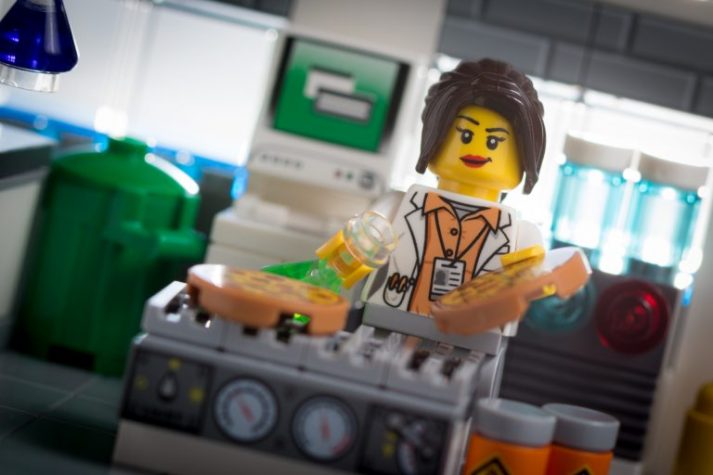
YES, it would be awesome if you could drink tea or wrap yourself in plastic to magically lose fat.
YES, it would be amazing if a 30-minute bootcamp class allowed you to eat junk food all day, every day, and not gain an ounce.
YES, it would be amazing if you could take a magic pill that gave you the body you had 10 years ago.
It would also be cool if superheroes were real and I could fly.
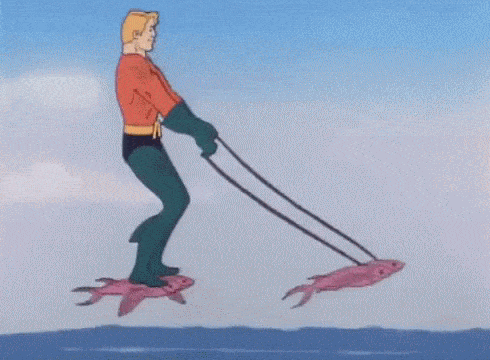
Well, not like that.
Come on, Aquaman. People can see you.
We live in a world of science, physics, and thermodynamics.
This means we should ALWAYS look at life through the following lenses:
- Occam’s Razor: The simplest explanation is PROBABLY the correct one.
- Law of energy: Energy can’t be created or destroyed, only transformed.
- Reality: If it sounds TOO good to be true, it probably is.
Let’s apply this to our waistlines:
If we are overweight…
It’s not because we have “toxins” in our bodies that need to be flushed out.
It’s not because we didn’t spend enough time in the “fat-burning” zone during our “muscle confusion” bootcamp.
It’s not because we need fat-burning tea.
These are all pseudoscience buzz terms to sell products, and have no truth to their claims.
Occam’s Razor dictates the simplest solution is PROBABLY the right one.
So what’s the simple explanation to why we’re overweight?
Every day, we consume food that gets transformed into energy.
This food has three options once it enters our body:
- Fuel our bodily functions: fuel our organs, regulate our body temperature, etc.
- Pass through as waste: pee and poop.
- Get stored (usually as fat): saved for a rainy day.
If we are overweight, we are consuming more ‘energy’ than our bodies need every day. Because our body doesn’t need all of it, too much is being stored as fat.
This brings us to the main point of our nutritional focus:
If weight loss is our goal, we must consume FEWER calories than we burn on a consistent basis.
By doing so, our body has no choice but to dip into that “rainy day” fund of fat stores to still get all of its bodily tasks done each day.
Do this consistently, and that’s how we end up with a lower number on the scale and a smaller pants size.
“Steve I know I should eat less. It’s doing it consistently that’s the tough part. Have you tried CAKE?!”

Great point.
And yes, cake is awesome.
But we have to start somewhere!
And it starts here: we need to eat fewer calories, but it ALSO has to be sustainable and enjoyable, otherwise we’ll never stick with it.
And temporary changes produce temporary results. We want permanent weight loss!
Just saying “eat less” doesn’t factor the crazy biological, physiological, and/or emotional challenges we face every day:
We might eat when we’re stressed, depressed, or bored.
We might be on medication that is causing us to overeat without us realizing it.
We can’t eat just one potato chip without eating an entire bag.
We absentmindedly grab a handful of Peanut M&M’s when visiting Kevin in Accounting.
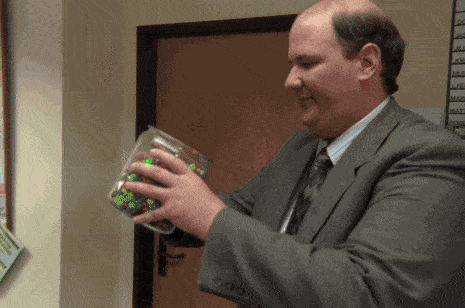
Not only that, but even when we pay attention to what we eat, studies show that we often underestimate our calorie consumption by 15+%.[10]
Crap. This just keeps getting worse!
What’s a smart nerd like you supposed to do in this scenario!?
If we KNOW we overeat without realizing it, and we KNOW restricting calories is tough to stick with long term, then the only path forward is to attack the problem differently.
Not with fit tea.
Nor with body wraps.
Not with “muscle confusion.”
But with science, math, and psychology.
What to Eat For Weight Loss

If weight loss is the goal, we need to shift our food choices to foods that give us more “bang for our buck” – healthy, filling, nutritious foods that fill us up and makes us less likely to overeat calorie-bomb foods.
These foods allow us to feel full, but still keep us under our calorie goal for the day:
- Protein like meat, fish, eggs, and so on.
- Fruit like apples, bananas, and berries.
- Vegetables like broccoli, Brussels sprouts, and kale.
- Carbohydrate sources like quinoa, legumes, oats, rice, and potatoes.
These are foods that take up a lot of space in our stomach and make us feel full.
If we do this consistently, without feeling miserable, we have a really good chance of not only losing weight, but keeping the weight off.
In contrast, here are some foods that are loaded with calories which DON’T fill us up – thus making it easy for us to overeat:
- High-calorie, easy to overeat foods like breads, french fries, pasta, and pizza.
- Soda, juices, and sugary coffee beverages.
- Candy, cookies, crackers, etc.
To really HAMMER this point home…
As we point out in “Can You Burn Fat and Build Muscle at the Same Time?” here’s what 200 calories look like, thanks to WiseGEEK.
Which ones do you think will make you feel full, and which ones will make you eat more than you realize?
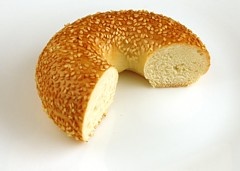
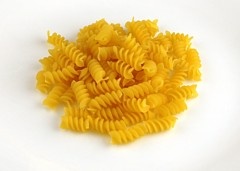
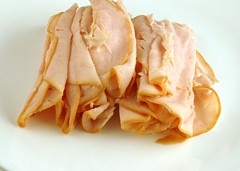
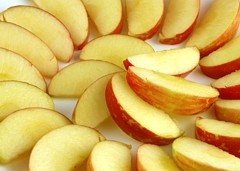
Can you get yourself to stop after 2/3rds of a bagel or a small handful of pasta?
Of course not!
One more example – here’s 200 calories of broccoli:
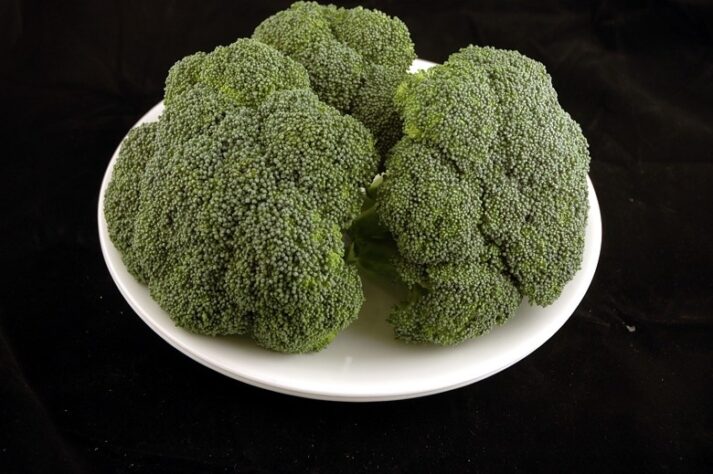
“Steve, that is an absurd amount of broccoli.”
Yup. It’s also the SAME number of calories as 2/3rds of a bagel (which doesn’t even include the calories from the cream cheese or butter).
Now, it’s insulting to say “You should eat more broccoli and less bagels. There’s yer problem.”
I’m merely pointing this out to emphasize the difference between energy (calories) and volume.
(Hate broccoli and vegetables? Read how to make vegetables taste good!)
Depending on what you eat, you could feel “OH SO FULL” after your meal or “Why am I already hungry again? NOM NOM NOM.”
Which means…
If you can start to make even SMALL changes, focusing on nutrient-dense, calorically-light foods like protein, fruit, and veggies, to replace some junk food – even occasionally, it’s going to shift the energy balance back in the right direction.
You’ll become more likely than not to eat fewer calories than you burn, moving you beneath your daily equilibrium.
Do that consistently, and you start to pull from those fat stores.
And we find ourselves at the holy grail:
Sustainable, non-miserable weight loss.
This is actually the secret sauce for ALL popular diets these days.
As we point out in our “What is the Perfect Diet” article, all the popular diets get you to eat more REAL food and less junk food.
They just all have their own unique marketing spin to sell cookbooks and courses and subscriptions.
Let’s look at each of these diets in a nutshell:
- Paleo: cut out grains and dairy. Consume only meat, veggies, fruits, and nuts.
- Keto: cut out ALL carbs. Consume only meat, veggies, nuts, and fatty sauces.
- Intermittent Fasting: cut out an entire MEAL every day.
- Mediterranean Diet: focus on REAL foods, with whole grains. Cut out processed foods.
- Carnivore Diet: Only eat meat. Remove everything else.
- Military Diet: Nevermind. Please don’t do this diet.
ANY of the diets above will result in temporary weight loss if you strictly follow the rules, but not for the reason you’d think.
It’s not because we’re designed to eat like cave people (though we are), or that our bodies function differently on a Ketogenic Diet (it does), or even that fasting has plenty of health benefits (it does!).
Those things are like 2% of the reason why they work for weight loss. [2% is a statistic I made up to emphasize the smaller importance of any ancillary benefit compared to the bigger picture]
The other 98%: they make us more likely than not to consume fewer calories on average than we usually eat, which will lead to weight loss in the long term… if you can stick with it.
And each diet has rules and guidelines that speak to the specifics of individual people.
If you’re freaking out about how to eat and which diet to pick and you’re worried if you’ll even be able to stick with it, you’re not alone.
It’s why we created our 1-on-1 Coaching Program!
To help people like you change their habits around food to start seeing permanent weight loss results without being miserable!
Which Diet Should I Pick to Lose Weight?

Nearly EVERY diet will work in the short term, because they all lead to temporary calorie restriction. Every diet above will fail you too in the long term, because you need to do the diet permanently to get the results permanently!
So in my opinion, you should only follow a strict diet like those above IF you can see yourself sticking with it consistently for the next 10 years.
“Steve, that’s melodramatic. Come on.”
That’s what I was going for.
If a diet sounds too restrictive to stick with permanently, then it’s too restrictive for you to devote weeks or months of your life to!
After all, temporary changes equal temporary results.
You’re better off picking a diet that you confidently feel like you can stick with permanently. You should be thinking in terms of “days and years,” not “weeks and months!”
Here’s the end goal we’re working towards:
Sustainable weight loss, weight maintenance, and actually enjoying life.
Looking in the mirror and being happy with what you see, knowing that the weight will stay off.
And most importantly, habits that allow us to enjoy life, have great meals with friends and family, while still reaching our goals
Not temporary changes, but rather permanent small adjustments that adjust over time as we start to see results and build momentum.
Sound good?
Let’s get back to basics and start learning about the food we’re putting into our bodies.
Cool? Cool.
A Primer on Strength Training

Conservatively speaking, strength training is the greatest thing ever invented in the history of the galaxy.
Okay, so maybe it’s third after electricity and Nintendo.
But I say this to make a point.
There’s a huge difference between “exercise” and strength training when it comes to body composition.
Coach Matt explains exactly why in this video on gaining muscle while losing fat:
We also cover this in a very in-depth manner in our “Can I Lose Weight and Build Muscle?” guide – which is one giant Harry Potter allegory that you’ll love – but I’ll share the basics right here.
If your goal is consistent, permanent, healthy weight loss and weight management, 80-90% of the battle will be nutrition,
When it comes to exercise, you really only have TWO things to focus on:
- What exercise do you love? Good. Do that.
- Strength train as often as you have time for.
I’ll touch on the first one quickly.
When you do exercise you love, you’re giving your heart and body a good workout. You’re reminding yourself “I am living healthy” and THUS you should be more likely than not to stick with your healthy eating strategy.
Notice I said “exercise you love.”
If you hate running, never run a mile again.
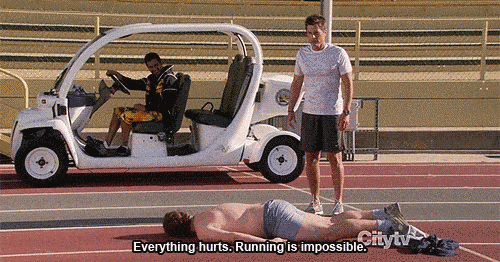
Hate going to the gym? Never set foot in one.
Hate bootcamps? Me too. Don’t do them.
Instead, go rock climbing, or hiking, or do yoga, or swing dancing, or LARPing.
Really, anything that gets you off your ass and moving. Cool? Cool.
How Strength Training Assists Weight Loss

Your body functions differently when you strength train, in all of the right ways.
We have a whole Strength Training 101 sequence that can you get you started, but I’ll whet your appetite with the nerdiest metaphor ever below.
You can find study[11] after study[12] after study[13] that shows you the benefits of strength training for weight management.
Let me explain it here quickly, borrowing from Harry Potter:
(You know, the wizard.)
At the Hogwarts School of Witchcraft and Wizardry, when each student arrives they put on the “Sorting Hat,” an actual hat that determines which House (group) that child will join for his time at Hogwarts.
The hat acts almost like a traffic director:
“Harry, you will go to Gryffindor! Draco, you will go to Slytherin!”
Your body operates in a VERY similar fashion: every day, it receives new calories (when you eat), and it needs to decide what to do with them!
For example:
You eat a large Hawaiian pizza and 20 ounces of Mountain Dew. Your body has to do SOMETHING with all those calories.
To keep things simple, let’s look at the 3 most common results.
It’ll sort those calories into one of three Houses:
A: Burn for Fuel.
B: Rebuild Muscle.
C: Store as Fat.
Your body sorts most of those calories into “Burn for Fuel.” There’s a number of calories your body burns each day just existing: to keep your liver functioning, your heart pumping, your brain operating, and so on – it burns a good chunk of calories just keeping the lights on.
Here are two quick examples (from our TDEE calculator!):
- A 6’, 34-year old male weighing 250 pounds burns 2,300 calories a day just by existing.
- A 5’5”, 40-year old female weighing 140 pounds burns 1,350 calories a day just by existing.
Now, if you don’t do any exercise, and you consume MORE calories than the rate you burn each day, the “Sorting Hat” in your body needs to put those calories somewhere!
Where do you think it’ll sort them?
“C: Store as Fat.”
However, your body’s sorting behavior changes when you strength train.
Specifically, when you train in a way that really challenges your muscles. This is completely relative to where you are at in your life right now:
- HEAVY weight training might be a 500 lb deadlift or a 5 pound dumbbell curl.
- INTENSE bodyweight training might be a handstand push-up or a knee push-up.
When you strength train – by picking up something heavy – your muscles are “broken down” during the exercise itself, and then they rebuild themselves stronger over the next 24-48 hours.
Guess what happens during those 24-48 hours?
Your body will divert as many calories as possible to “Rebuild Muscle!”
It also diverts additional calories to “Burn as Fuel” to handle this increased “muscle rebuilding” activity.[14]
This means two amazing things:
- Your metabolism is revved up for this time period, burning more calories than normal.
- Rebuilding muscle is a calorie taxing activity!
There are significantly fewer calories available for “Store as Fat.”
AND IT GETS BETTER.
When you consume fewer calories than your body burns each day, continuing to strength train will cause your body to get even more clever.
Let’s imagine a scenario where you’re eating fewer calories than you burn every day:
- You strength train regularly, and your muscles break down and need to be rebuilt.
- You don’t consume enough calories compared to how many calories your body needs to both rebuild muscle and fuel itself…
- So does your body just shut down?
NOPE!
Your body has been preparing for this, by storing any excess calories over the years in the “Store as Fat” house.
This is the moment your body has been saving up for.
This means your body can pull from “Store as Fat” to make sure all the work still gets done, including your daily functions as a human, and rebuilding the muscle.
This is the Tri-wizard cup[1] of physical transformation victory:
- You get stronger and keep the muscle you have.
- You burn through the fat you’re trying to get rid of.
- You’re decreasing your body fat percent and keeping your muscle = look good naked.
This would be a “win-win-win” according to Michael Scott, Regional Manager, Dunder Mifflin Scranton.
Want help learning how to strength train? You can absolutely build your own workout, or you can work with one of our coaches who can create a custom program that’s specific to your goals and lifestyle.
We’ll even make sure you’re doing the movements correctly via video, because we’re nice like that 🙂
“How I Lost Weight” (Megan’s Story)
In the video above, Megan explains her incredible journey to lose over 200 pounds!
(Not a typo.)
I know, freaking AMAZING.
I bring it up, because Megan’s story demonstrates a lot of the key points brought up in today’s guide, especially the importance of strength training.
She also talks about:
- How she struggled for years to lose weight.
- The importance of “starting small.”
- Why she destroyed her scale.
For more on Megan, make sure you read her interview with us!
BACK TO BASICS: How To Guarantee Successful Weight Loss

If you’re still reading, then there is hope for you yet.
You can do this – but you have to be smart and diligent about it! Stop trying to exercise your way thin, and stop trying to find ‘get fit quick’ solutions.
Instead, take this one day at a time. We’re here for you!
We talk about proper nutrition in our big “Healthy Eaters” guide, and we go more in-depth into the specific foods that we recommend, but it starts here:
- You have to eat fewer calories than you eat now to lose weight, and do so permanently.
- The best way to do that is to substitute more protein and veggies onto your plate.
- Strength training will supercharge your results, building muscle while making it easier to burn extra fat.
Understand you’re overeating, and forgive yourself for doing so – most foods have been designed for you to overeat!
YOUR MISSIONS, SHOULD YOU CHOOSE TO ACCEPT THEM:
#1) Pledge to stop buying snake oil. If you’re not sure, ask yourself “Does this sound too good to be true?” and “What would Steve do?”
In addition: stop doing exercises you hate just to lose weight. Pick exercises you enjoy, and put all of your focus on slowly adjusting your nutrition instead!
Shun the Dark Side and come back to the Light!
#2) Be deliberate in your decisions. Every calorie counts. Every decision counts. So make ONE different decision as a result of you being more aware of what you put in your body.
Drinking water instead of soda or juice.
Swapping out a salad for fries once per week. It all counts, but make your decision deliberate.
You’re a smart person. You know what foods should be daily staples, and what foods should be occasional treats. It all counts. So make ONE decision differently to prove to yourself that you can change.
#3) Educate yourself on the serving size of ONE food that you eat regularly. Google it. Find out if what you THINK is a serving and what’s actually in a serving is anywhere close to accurate.
You might be surprised to find out:
- A serving of pasta is HALF the size of what you normally eat with your meal.
- How much peanut butter is considered a serving (hint: it ain’t much).
- There are 2.5 servings in that one bottle of Green Machine Naked Juice.
I don’t want you to change the food or the portions yet. I just want you to educate yourself on what you’re eating, and compare it to how much you thought you were eating.
NEXT STEPS IF YOU WANT TO GO FARTHER!
If you are looking for more hands-on guidance, we have three options for ya!
1) 1-on-1 Online Coaching Program! If that sounds like you, and you’re looking for nutritional guidance, custom strength training routines just for your situation, and expert accountability, we’d love to hear your story!
2) If you want a roadmap for sustainable weight loss, check out NF Journey. Our fun habit-building app helps you exercise more frequently, eat healthier, and level up your life (literally).
Try your free trial right here:
3) Join the Rebellion! Join our free email list and community – I send out two fun emails a week – and I’ll send you our free 10-level Nutrition Guide along with a bunch of other free bonuses. Get them when you sign up in the box below:
Download our free weight loss guide
THE NERD FITNESS DIET: 10 Levels to Change Your Life
- Follow our 10-level nutrition system at your own pace
- What you need to know about weight loss and healthy eating
- 3 Simple rules we follow every day to stay on target
#4) Do a strength training routine! We have so many awesome free options for you here on Nerd Fitness. Pick the ones that jump out at you!
“What is the biggest question you have around nutrition, strength training, and weight loss?”
Oh and please, go eat a vegetable 🙂
-Steve
PS: I know this HOPEFULLY goes without saying, but this is the internet: I totally get that this issue is very complicated to begin with. If you have a hormonal imbalance, PCOS, are on medication for any number of reasons, it could also be affecting your weight.
PLEASE speak with your doctor about your weight and any changes you are looking to make!
###
Photo source: A good Sunday to you, Can I have your bicycle, Speed!, Swimming pool, Pizza lab, Dinner is set, Happy monday!, Speed.



